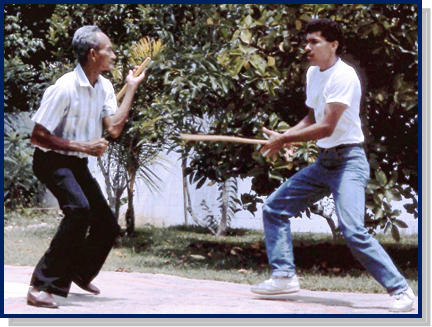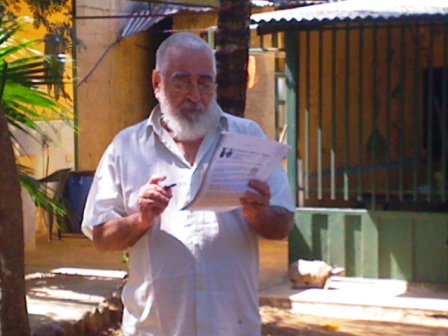Venezuelan stick fighting: a cultural heritage and legacy (part 2)
To practice stick fighting, we usually relate each other in an informal environment; of course, with a respect, in a master-disciple relationship of friendship. Master Baudilio Ortiz commented to the master Eduardo Sanoja back in the 80`s: “Do not teach, without friendship.”
It is and invaluable truth. You cannot teach this art, unless you have a relationship of trust and friendship between the master and the apprentice. This implies knowing ourselves. It also implies to know where we came from, who left us the cultural legacy of a way of fighting with its own philosophy.
This is why we know or must know who those who preceded us were. In this sense, I give a good part of the line of the cultural manifestation that I practice:
I started practicing Venezuelan stick fighting in 1991. Master Don Mercedes Pérez Amaro was the one who taught me such cultural heritage.
Master Pérez (La Piedad, 1917–2003) was a stick fighter since the first years of his youth, an expert in the art of fighting with sticks. He was given a woman’s name because he was born on September 24th, the day of Las Mercedes, according to the Catholic calendar. He was a disciple of Master Gualberto Castillo (1906–1977), from La Piedad, a town in Palavecino municipality, Lara state.
Master Castillo was a disciple of the Master Clarencio Flores (second half of the 19th century – 1943). Master Flores was from Las Palomitas, a small village in Chiquinquirá parish, Torres municipality, Lara state. He emigrated around the year 1900 to the village of La Rinconada, near the town of Curarigua de Leal in the Antonio Díaz parish, Torres municipality, in order to work in sugarcane farms and mills. There, among other people, he improved his skills as a stick fighter with the Master Sablón Vásquez. At a later time, Flores emigrated to La Piedad, where, apart from working in the sugarcane farms of the area, he became well-known a recognized outstanding stick fighter.

Finally, in relation to Master Vásquez, he was from La Vela de Coro which is nowadays a city and port of Venezuela, capital of the Colina municipality of the Falcón state. He was born in mid 19th century. Acording to Gonzalez (2007:215), Master Vásquez became and expert fighter. He learns from old masters and some relatives. When he was 44 years old, en pleno gobierno de Joaquín Crespo, he moved to Lara state. First, he was in Baragua village. He met Manuel María Escalona who invited him to work in sugarcane farms in La Rinconada. He remained there several years forming a center to practice stick fighting. According to Dudamel – a retired teacher from Curarigua who worked in the school of La Rinconada – in a conversation we had in 2013, Vásquez went to La Rinconada by the year 1900.
After Master Don Mercedes Pérez passed away, I continue practicing in the Stick Fighting Center “Clarencio Flores.” It is located in Sector Las Tunas II, Agua Viva parish, Palavecino municipality, Lara state. This center belongs to the Master Eduardo Sanoja who also was a disciple of the Master Pérez. Nowadays, Sanoja –a “Living Cutural Heritage”– is recognized as an expert, promoter and caretaker of the fight with sticks. He has written articles and important books in which the research and the monitoring to its sources ensure its dissemination, knowledge and permit that its practice rises to the levels of respect that this cultural value deserves.

Some disciples of Master Don Mercedez Pérez: Pedro Pérez, Eduardo Sanoja, Livio Girotto, Abel José y Luis Alejandro Pérez Wilke, Danny Reinoso. He taught others, but I only was his disciple during his last 12 years of life.
I`ll continue writing about this topic...blessings!
For more information about this venezuelan method of fighting, please check the post:
https://steemit.com/culture/@miguelcordero/venezuelan-stick-fighting